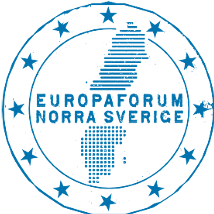The European Forum of Northern Sweden (EFNS) is a network for politicians on local and regional levels from Norrbotten, Västerbotten, Jämtland Härjedalen and Västernorrland. The EFNS is a meeting place and knowledge arena where the EU´s politics is analyzed and discussed in regard to issues pertaining to northern Sweden. The EFNS monitors European issues with the aim of influencing EU law, EU strategies and action programs as well as the EU budget. The purpose of the EFNS is to guard the interests of northern Sweden both on the European arena as well as on the national level in issues with a clear European perspective.
The role of the regions in European digitalization
The European Forum of Northern Sweden encourages the EU´s legislative institutions to within the efforts of digitalization to consider that
- The European regions are key actors in the EU´s strategy for the implementation of the Unions strategies for European leadership in Digitalization of European industries and economy
- There are possible synergy effects between the EU´s ambitions within Digitalization and the efforts for growth and regional development within the Regional development fund, Social Fund, Horizon Europe, the program for a digital Europe, smart specialization as well as industry and SME policy
- The Unions strategies and financing instruments for digitalization should be designed with consideration of the regions abilities to contribute to the change
European leadership for digitalization
Efforts for European leadership in digitalization is highlighted in Multiannual financial framework, MFF, the European Green Deal as well as in the European commission work program for 2020. Crucial for the EU´s abilities are the EU strategies formulated in the European Data Strategy, White Paper on Artificial Intelligence, Digital Services Act as well as a new Industrial Strategy for Europe and a dedicated SME Strategy. For the implementation the EU financing instruments will be vital, with the new program for Digital Europe and Horizon Europe but also the instruments within the regional policy.
Union wide digitalization is not only crucial for Europe´s contribution to the UN´s global goals for sustainable development but also for the industry’s ability to strengthen European competitiveness. At the same time the digital transition means challenges in the future adaptations in the labor market, global competitiveness, and security. A strong industry and innovation systems is crucial for the Unions ability to utilize the possibilities of digitalization and to cope with its challenges.
Regions driving digitalization
The European regions are key actors within the move towards digitalization and can in cooperation with academy, research institutes and commerce play an even larger role in the implementation of the EU´s strategies and support. In Sweden, the regions carry the responsibility for regional growth policy and the strategies for the regional development funds which constitutes a resource for the dissemination and inclusion of digital solutions all over Europe with its existing networks and organizations.
The regions work within Smart Specialization enables strategic efforts and the implementation of the EU´s strategies in combination with an inclusive bottom-up process. The approach should be one of the platforms for the EU´s ambitions within digitalization, for example within the set up of a network of European Digital Innovation Hubs within the Program for digital Europe. There are obvious profits to be made by connecting these efforts to the region’s efforts for regional growth in their strategies for Smart Specialization.
Northern Sweden and digitalization
Northern Sweden has strong research actors that contribute to the digital change in the region as well as strengthens the capacity of Europe to lead the global change. Luleå university of technology, Umeå University, Mid Sweden University, The Swedish University of Agricultural Sciences and research institutes together with Science parks, cluster formations and private companies have crucial abilities for the region´s digital transformation and have a strong capacity in for example AI, EDGE, 5G and process automation. The region has unique challenges and opportunities in facing the digitalization; the research actors are integrated with the industries end entrepreneurial networks of the region in a strong innovation system in combination with a world leading industry. The region also has a sparsely population structure, cold climate, rich natural resources, and a remote geography that entails unique conditions to care for and use the opportunities of digitalization. Therefore, the region and the regional influence of the planned efforts both from the EU and from national Swedish actors is of great importance for the sustainable development and competitiveness of the region.
Adopted by Europaforum Norra Sverige
Glenn Nordlund (S) Ordförande EFNS Region Västernorrland
Åsa Ågren Wikström (M) Vice ordförande EFNS Region Västerbotten
Jonny Lundin (C) Region Västernorrland
Erik Lövgren (S) Kommunförbundet Västernorrland
Rickard Carstedt (S) Region Västerbotten
Ann Åström (S) Region Västerbotten
Nils-Olof Lindfors (C) Region Norrbotten
Britta Flinkfeldt (S) Norrbottens Kommuner
Anders Josefsson (M) Norrbottens Kommuner
Elise Ryder Wikén (M) Region Jämtland Härjedalen
Robert Uitto (S) Region Jämtland Härjedalen
Thomas Andersson (C) Region Jämtland Härjedalen
Daniel Danielsson (C) Kommunerna i Jämtlands län
